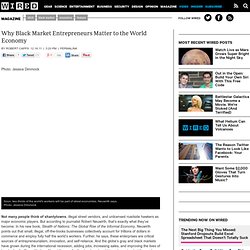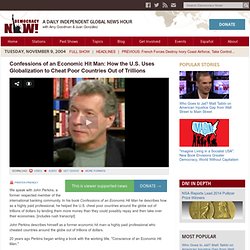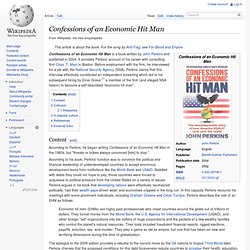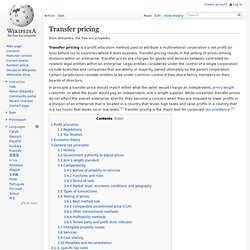

Why Black Market Entrepreneurs Matter to the World Economy. Soon, two-thirds of the world's workers will be part of street economies, Neuwirth says.Photo: Jessica Dimmock Not many people think of shantytowns, illegal street vendors, and unlicensed roadside hawkers as major economic players.

But according to journalist Robert Neuwirth, that’s exactly what they’ve become. In his new book, Stealth of Nations: The Global Rise of the Informal Economy, Neuwirth points out that small, illegal, off-the-books businesses collectively account for trillions of dollars in commerce and employ fully half the world’s workers. Further, he says, these enterprises are critical sources of entrepreneurialism, innovation, and self-reliance.
And the globe’s gray and black markets have grown during the international recession, adding jobs, increasing sales, and improving the lives of hundreds of millions. Wired: You refer to the untaxed, unlicensed, and unregulated economies of the world as System D. “There are the guys who sneak stuff out of the port. Neuwirth: Yeah. Corporate Assassins Determine World Order. DN! Confessions of an Economic Hit Man: How the U.S. Uses Globalization to Cheat Poor Countries Out of Trillions. John Perkins describes himself as a former economic hit man–a highly paid professional who cheated countries around the globe out of trillions of dollars. 20 years ago Perkins began writing a book with the working title, "Conscience of an Economic Hit Men.

" Perkins writes, "The book was to be dedicated to the presidents of two countries, men who had been his clients whom I respected and thought of as kindred spirits–Jaime Roldós, president of Ecuador, and Omar Torrijos, president of Panama. Both had just died in fiery crashes. Their deaths were not accidental. They were assassinated because they opposed that fraternity of corporate, government, and banking heads whose goal is global empire. John Perkins goes on to write: "I was persuaded to stop writing that book.
But now Perkins has finally published his story. John Perkins, from 1971 to 1981 he worked for the international consulting firm of Chas T. This is a rush transcript. JOHN PERKINS: Thank you, Amy. AMY GOODMAN: Okay. Confessions of an Economic Hitman. Wikipedia: Confessions of an Economic Hit Man. Content[edit] According to Perkins, he began writing Confessions of an Economic Hit Man in the 1980s, but "threats or bribes always convinced [him] to stop.

" According to his book, Perkins' function was to convince the political and financial leadership of underdeveloped countries to accept enormous development loans from institutions like the World Bank and USAID. Saddled with debts they could not hope to pay, those countries were forced to acquiesce to political pressure from the United States on a variety of issues. Perkins argues in his book that developing nations were effectively neutralized politically, had their wealth gaps driven wider and economies crippled in the long run. In this capacity Perkins recounts his meetings with some prominent individuals, including Graham Greene and Omar Torrijos. Economic hit men (EHMs) are highly paid professionals who cheat countries around the globe out of trillions of dollars. Criticism[edit] Response[edit] In popular culture[edit]
Wikipedia: Transfer pricing. Transfer pricing is a profit allocation method used to attribute a multinational corporation's net profit (or loss) before tax to countries where it does business.

Transfer pricing results in the setting of prices among divisions within an enterprise. Transfer prices are charges for goods and services between controlled (or related) legal entities within an enterprise. Legal entities considered under the control of a single corporation include branches and companies that are wholly or majority owned ultimately by the parent corporation. Certain jurisdictions consider entities to be under common control if they share family members on their boards of directors. In principle a transfer price should match either what the seller would charge an independent, arm's length customer, or what the buyer would pay an independent, arm's length supplier.
How the Economic Machine Works. Weaknesses of fractional reserve lending. Jekyll Island: The Truth Behind The Federal Reserve (2013) Documentary: The Money Lobby P1. Federal Reserve Districts and Banks.